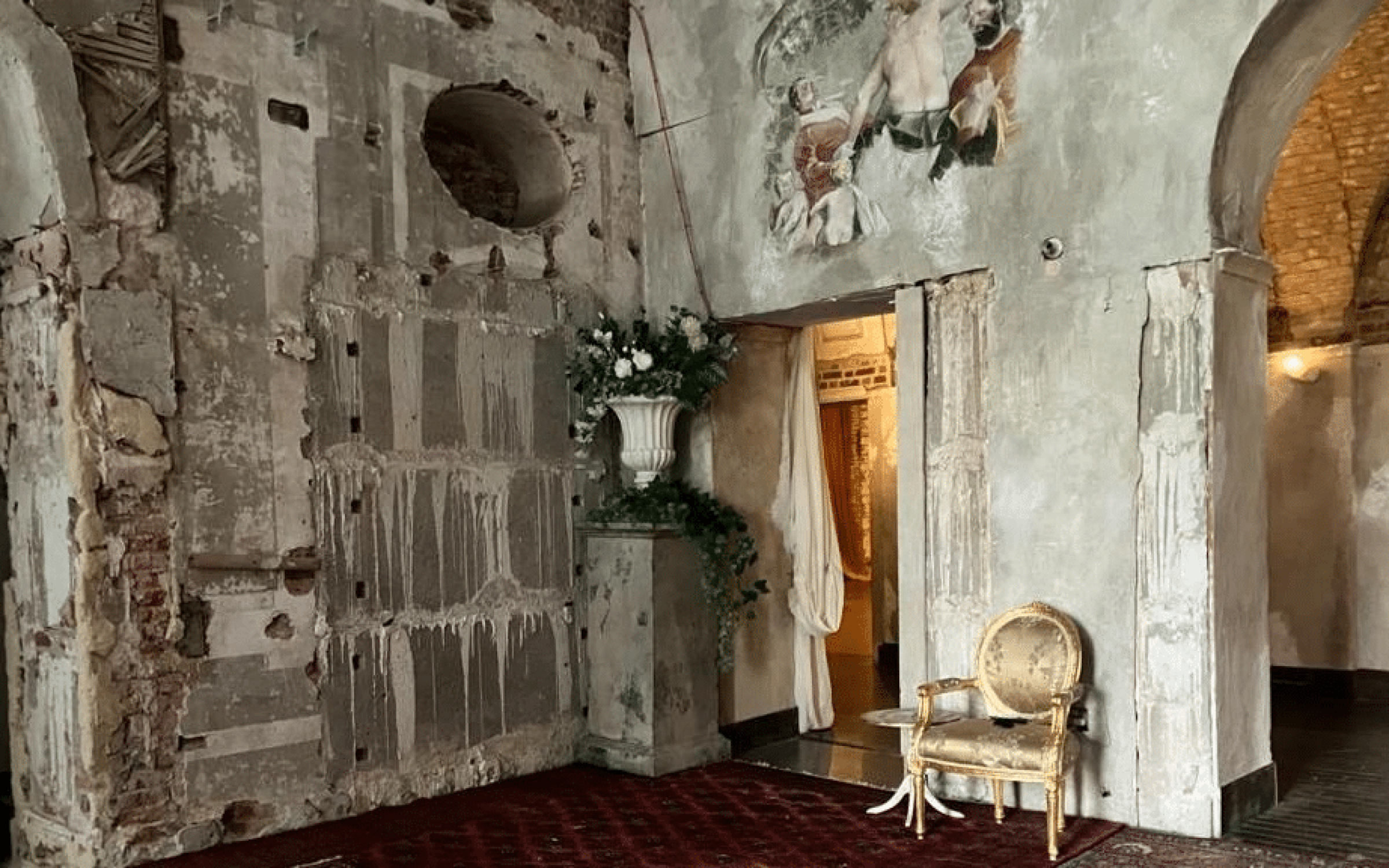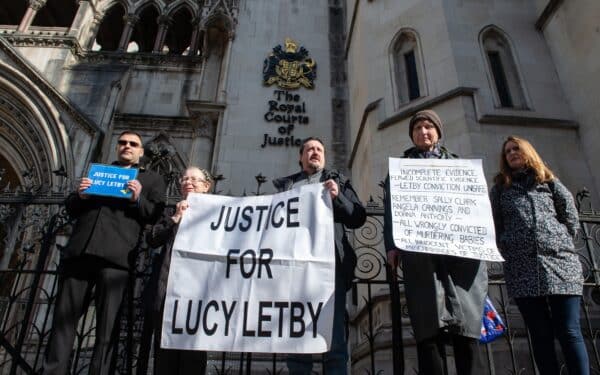OperaGlass Works’ ambition is no less than to create a new genre of opera. Their upcoming film of La Traviata, Giuseppe Verdi’s 19 th century classic love story, set to be released this autumn, will not be an opera performance viewed through a lens from a distance.
Their lens will be the channel to you, the audience, to whom singers will communicate directly, creating an unrivalled sense of intimacy.
Selina Cadell and Eliza Thompson are the founders of London based OperaGlass Works. I came across ‘the terrible twosome’ when I reviewed Benjamin Britten’s The Turn of the Screw, which they produced and directed as a film when the physical, onstage version at London’s magically atmospheric Wilton’s Music Hall was scrubbed by Covid.
Why ‘terrible twosome’? Because they will stop at nothing to attain their artistic purpose. When I met Eliza in New York for a coffee, because they “happened to be in Manhattan,” last February it turned out they were staging Susie Eddie Izzard’s one-person Hamlet in Greenwich Village. Selina was back at the theater. No time for coffee.
The sort of simple project one casually undertakes when time hangs heavy on the hands. Of course, Reaction reviewed the Hamlet opening night. It was then I learnt La Traviata was in the works.
In a Zoom chat yesterday, Selina told me the Izzard show went down better in New York than London. Apparently snooty UK critics balked at the artist stepping out of his “box”. “Shakespeare, dear boy/girl/whatever? Surely not for you?” A box entirely in their minds and of their construction.
How did they get to OperaGlass Works? In the words of Thompson and Cadell. “We first met on a production of The Way of the World at Wilton’s Music Hall. This production was entirely generated by actors, designers, musicians, and friends. We had no money, it worked from the ground up, with everyone putting their hands back in the paint pot. Looking back, this collaborative project was the template for OGW.”
They moved on to ponder, “Could we create an environment to produce excellent opera for less money?” OperaGlass Works had begun.
Because of the artistic reputation for excellence gained from The Turn of Screw the cast of La Traviata is strong. Baritone, Roderick Williams, one of the UK’s most sought-after artists, sings the pivotal role of Germont, the father whose family is about to be disgraced by the liaison between his son, Alfredo and the fabled courtesan, Violetta.
The lead role, Violetta, is taken by Portuguese soprano, Susana Gaspar. I am familiar with her voice through recordings with Opera Rara, Semiramide, Le Portrait de Manon and Les nuits d’été. Her dramatic soprano will capture the conflicting emotions of the tragic heroine perfectly. I strongly recommend Gaspar’s Le Portrait de Manon.
Alfredo is tenor, Thomas Elwin, whose debut – crowd funded – album, Le vase brisé recorded with British/American pianist, Lana Bode is well worth listening to. Go on, hit the link. You will be relieved to discover they achieved their £3k funding target last Tuesday! The crowd has moved on.
Verdi’s score is provided courtesy of a small version of the Royal Scottish National Orchestra, with the Royal Opera House’s Richard Hetherington wielding the baton. For intimate works, reducing the scale of the orchestra works well. You don’t need Stokowski overkill. Longborough Festival Opera’s musical director, Anthony Negus, showed how it should be done with his Ring Cycle earlier in the year.
Costumes are vital for the “feel” of the production. Rosalind Ebbutt, famous for her fabulously named Frock Flicks – Bitchy is our brand, is in charge of the dressing up. Modus operandi is to mix the old with the new. Skinny black jeans instead of britches, modern materials, introduction of colour displacing 19 th century “stuffy”, keeping corsets, but wearing them visibly. The point is that while of the period the costumes seem real to the viewer.
I shall assume familiarity with the plot of La Traviata. For those who do not follow consumptive 19 th century opera, a full synopsis is to be found here.
When in Act 1 Violetta, the tragic heroine sings in response to her admirer, Alfredo’s famous “drinking” area – in which he more than hints his heart has been pierced by her fair eyes – Violetta will not be engaging just the room.
She will sing straight to that all seeing lens – that’s you. Not an audience of 1,200, sitting jaw dropped, but safely distanced in plush seats:
“I shall divide my gaiety among you all;
Everything in life is folly, except for pleasure.”
Wow! Never mind that pushy Alfredo, you’re still in with a shout. Paris’ most tantalising courtesan is cutting you in on the action. How engaging is that? OperaGlass Works looks after you!
Film, schmilm, haven’t we seen it all before? After all, the New York Met’s High-Definition broadcasts in cinemas span the globe. Covid incarceration was the making of that medium as streaming the back catalogue eased the burden of lockdown isolation and the Met mounted a series of original, stunning, distanced concert performances.
One of the few boons of those miserable times. Probably the only thing that stopped the citizens of Ohio eating their cats and dogs. A practice, so some tell us, that has been inexplicably resumed.
Numerous artsy online channels – EuroArts, Medici, Marquee TV – blossom with operatic offerings. Never mind YouTube, where even small opera companies, like Livermore Valley Opera can bring a tolerably good production of Carlisle Floyd’s Of Mice and Men from the Californian rural boondocks to the world.
OperaGlass Works’ productions stand out from the crowd. That is partly down to the careful choice of location. This time a shabby-chic tumbledown English country pile vies to be star of the show. “Distressed” is understatement, as the interior décor declaims. But the atmosphere, from the stills I have seen, reeks of Paris.
The production shots look fabulous. As were the settings in The Turn of the Screw, when Wilton’s Music Hall auditorium was transformed into a house of mystery and threatening corn waving fields.
I understand that when Germont arrives to explain to Violetta his daughter cannot be married because of the scandal she is stirring up with Alfredo, it will be in an alfresco, outdoor setting, heightening the impression that Germont has turned up in the country on the “off chance”.
The production has not been untroubled. Finance has been hard to come by. But the ‘terrible twosome’ are closing in on the finishing line. A final push would, still, be greatly appreciated. Here is their Support Us page. Having been badly let down by a previous channel, release is imminent on SkyArts.
I can’t wait to see OperaGlass Works’ La Traviata in all its finery. Where else would I be looked at in the eye and told by one of Paris’ most beautiful women?
“Take this, it is a portrait painted some years ago.
It will help you to remember the one who loved you so.”
And Another, Sad, Thing
The Daily Telegraph Obituary column caught my eye. Looking out at me was my friend, Chris Pollard, former publisher of Gramophone magazine, music enthusiast, erstwhile business associate, devotee of all things musical and theatrical, car buff, bon viveur and the most thoughtful friend anyone might have.
The puzzle that he had not replied to my email of the previous week was tragically explained. Chris was the most diligent of correspondents. Only a few weeks ago I had heard from him with a flattering and informative comment on my Reaction review of Anthony Minghella’s Madama Butterfly at New York’s Met.
Of course, he had known Minghella. Why hadn’t I thought of that and asked him for some colour before I wrote it?
“The Butterfly review is splendid! The double perspective works so well and allows you, rightly, to celebrate Minghella (a genius, as you suggest): also a friend of my theatre project. His Whale Music was the girls’ sophomore production at the King’s Head in Islington: they loved him. Max, his son – now an established film and tv actor – became a firm friend.”
Praise from Chris was praise indeed. He knew most people worth knowing in the arts world. I remember his Out of the Blue theatre enterprise of the early noughties. He even gave ou daughter, Jane a role backstage.
The Pollard family was the custodian of Gramophone – probably the most influential serious music publication in the world – after its quirky founder in 1923, Scottish author, Sir Compton McKenzie, surrendered the reins.
In 1977 Chris, who had started in the advertising department, but quickly realised that was not the engine room of the publication, inaugurated the annual Gramophone Annual Awards, reeling in an ITV audience in its millions.
Chris was always up for lunch – and innovation. In the early 90s, after conductor Stephen Layton, then Music Director of Temple Church Choir, had premiered a performance of The Veil of the Temple, an all-night vigil performance of eclectic religious music by Sir John Taverner, I was describing the atmospheric procession of chanting singers from Temple Church to the Middle Temple Gardens in the summer dawn light.
Nothing could curb Chis’ enthusiasm. “It would go down a bomb in Arles”. Nothing for it but to organise a lunch with Stephen. The lunch was a vigil all its own. At the end, after many undoubtedly brilliant ideas and vintages were shared, none of us was capable of recalling much. Merci, Bacchus. Nothing ever happened. Probably just as well. But, what an afternoon!
I am sure there are many who can recount similar heart-warming anecdotes about Chris Pollard, for whom the term “scholar and gentleman” could have been invented. RIP.
Write to us with your comments to be considered for publication at letters@reaction.life





